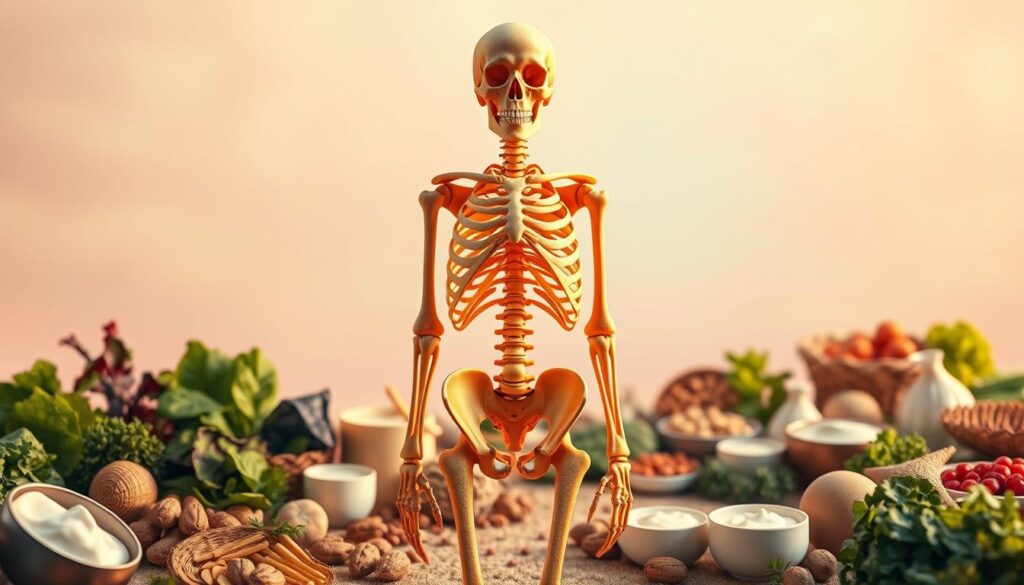Have you thought about how your diet can help keep your bones strong? What you eat today can greatly affect your bone health for years. It’s important to know the right nutrients and habits for strong bones. This guide will give you useful tips and tricks to support your bones at every age.
Key Takeaways
- A balanced diet rich in essential nutrients is key for bone health.
- Focus on calcium, vitamin D, and magnesium for strong bones.
- Regular exercise helps strengthen bones, just like a good diet.
- Watch out for foods that might harm your bone health.
- Adjust your diet for healthy bones based on your age and lifestyle.
Why Bone Health is Important
It’s vital to understand how important bone health is for everyone. Strong bones help us move and protect our organs. They grow mainly in childhood and adolescence, making these years very important.
Eating a diet rich in nutrients is key to having strong bones. Without the right food, you might get osteoporosis. This condition makes bones break more easily as you get older.
Bones are always being rebuilt in our bodies. This shows how important it is to eat well and live healthily. Bad bone health can cause many problems, affecting how we feel overall.
By focusing on preventing osteoporosis, you can keep your bones healthy for life. Making smart food choices and living a healthy lifestyle is worth it in the long run.
How to Build Strong Bones During Childhood and Adolescence
Building strong bones early in life is key for a healthy skeleton. During childhood, your body changes a lot. This makes it a critical time for bone health.
Nutrition is very important during this stage. Eating enough calcium and vitamin D helps your bones grow. It also makes them stronger, reducing bone density risks later.
Eating a balanced diet is essential. Foods like dairy, leafy greens, and fortified cereals are great. They give your body the vitamins and minerals it needs. For teenagers, focusing on adolescence nutrition is even more important because of their fast growth.
Doing weight-bearing exercises is also vital. Activities like jumping, running, and sports make your bones stronger. Combining exercise with a healthy diet sets a strong foundation for your bones. This can help prevent osteoporosis later on.
Eating for Stronger Bones: Key Nutrients You Need
Bone health depends on key nutrients called bone-building nutrients. Calcium is a top choice. Adults need about 1,000 mg of calcium each day for strong bones. You can get it from dairy, leafy greens (except spinach), and fortified foods.
Vitamin D is also key, helping your body use calcium better. Most adults need 600 IU of vitamin D daily. You can find it in sunlight, oily fish, and fortified foods. If you don’t get enough, you might need supplements.
Vitamin K is another important nutrient. It helps minerals stick to bones, keeping them strong. You can find vitamin K in kale, broccoli, and fermented foods.
Foods to Include for Improved Bone Health
To keep your bones strong, it’s important to eat the right foods. Focus on foods rich in calcium. Dairy products like milk, cheese, and yogurt are great sources of calcium. They also have other nutrients that help your bones.
Leafy greens are also key for bone health. Kale and broccoli are full of calcium and vitamins like K. Eating these greens often helps keep your bones strong.
Don’t forget about fortified foods. Some cereals and plant-based milks have added calcium and vitamin D. Adding these to your meals helps ensure you get the nutrients your bones need.
The Role of Protein in Bone Density
Protein is key to keeping bones strong. It makes up a big part of bones, helping them stay sturdy. Eating foods rich in protein is vital for bone health. Good sources include lean meats, dairy, legumes, and nuts.
But, it’s important to balance protein with calcium. Too much protein without enough calcium can harm bones. A diet rich in both nutrients helps keep bones strong and prevents osteoporosis.
| Protein Source | Protein Content (per 100g) | Calcium Content (per 100g) |
|---|---|---|
| Chicken Breast | 31g | 15mg |
| Greek Yogurt | 10g | 110mg |
| Lentils | 9g | 19mg |
| Almonds | 21g | 264mg |
The Importance of Physical Activity for Strong Bones
Physical activity is key for your overall health. It helps your bones grow stronger and denser. Activities like walking, running, and hiking make your bones work harder, which is good for them.
Adding strength training to your routine boosts these benefits even more. It builds muscle and strengthens bones. When you do weightlifting or resistance exercises, your bones get stronger. This is very important as you get older to prevent bone loss.
| Type of Exercise | Description | Benefits for Bone Health |
|---|---|---|
| Weight-Bearing Exercises | Activities where you move against gravity while staying upright. | Stimulates bone formation, increases bone density. |
| Strength Training | Exercises that use resistance to build muscle strength. | Enhances muscle mass, combats age-related bone loss. |
| High-Impact Activities | Sports like basketball or aerobics that involve jumping. | Promotes robust bone density due to the stress applied to bones. |
It’s important to mix physical activity and strength training for strong bones. Make these exercises a big part of your daily routine. They help keep your bones healthy and your body strong.
Understanding Foods that May Hinder Bone Health
Your diet plays a big role in your bone health. Some foods can harm your bones by reducing bone density. For example, too much sodium can lower calcium levels in your body.
This is bad news for people with bone health issues. High sodium can cause you to lose calcium through urine. This is why it’s important to watch your sodium intake.
Caffeine can also affect your bones. Drinking a lot of caffeine can make it harder for your body to absorb calcium. This can weaken your bones over time.
It’s key to keep an eye on how much caffeine you drink. This includes coffee, tea, and soda, which are all high in caffeine.
Other lifestyle choices can also harm your bones. Drinking too much alcohol can increase your risk of osteoporosis and fractures. It’s important to limit alcohol and avoid smoking.
Knowing which foods are bad for your bones helps you make better choices. This knowledge can lead to healthier habits that support strong bones for years to come.
How to Create a Balanced Bone Health Diet
A balanced diet is key for strong bones. Eat a variety of foods to get all the nutrients you need. Include fruits, veggies, whole grains, and protein from fish, poultry, or dairy.
This mix helps you get enough calcium and vitamin D. These are important for keeping your bones dense.
It’s also important to keep a healthy weight for your bones. Being too thin or too heavy can weaken your bones. Aim for a diet that helps you maintain a healthy weight.
Choose meals that are full of nutrients and support bone health. This way, you can help keep your bones strong for years to come.
Specific Considerations for Older Adults
Aging and bone health are closely connected. Older adults need to focus on their nutrition. As you get older, your body needs more calcium and vitamin D.
This is because your body absorbs these nutrients less efficiently. Hormonal changes, like those during menopause, also play a role. It’s vital to keep these nutrients at the right levels to prevent osteoporosis.
Eating foods rich in calcium and vitamin D is key. Choose fortified dairy, leafy greens, and fatty fish. A balanced diet helps meet your nutritional needs. A well-rounded diet supports your overall health.
Don’t forget to get regular check-ups and screenings for bone density. Catching deficiencies early helps maintain bone health. Include protein in your diet to help with muscle and bone support.
In short, focus on calcium and vitamin D, and get regular health checks. This will help keep your bones strong as you age.
Nutrition for Healthy Bones: Plant-Based Considerations
Keeping your bones healthy on a plant-based diet means paying attention to calcium. You can get enough calcium from calcium sources for vegans like fortified plant milks, kale, tofu, almonds, and legumes. Eating a mix of these foods daily boosts your diet and meets the daily calcium need of 1,000-1,200 mg.
Vitamin D is key for calcium absorption, but it’s hard to get enough from vegan foods. Sunlight helps, and you can also find fortified plant milks or vegan supplements. Aim for 200-600 IU of vitamin D each day.
Protein is important for muscle, which helps bones. You can get plenty of plant-based protein from lentils, beans, nuts, seeds, and whole grains. Women need 46 grams of protein daily, and men need 56 grams.
Meeting your calcium needs is easy with a little meal planning. Check out a detailed article on healthy eating for tips. These steps will help your plant-based diet support your bone health well.
| Food Source | Calcium Content (mg) | Additional Nutrients |
|---|---|---|
| Fortified Plant Milk | 300-500 | Vitamin D, Protein |
| Tofu | 200-400 | Protein, Iron |
| Kale | 180 | Vitamin K, Fiber |
| Almonds | 260 | Vitamin E, Healthy Fats |
| Chickpeas | 80 | Protein, Iron, Fiber |
Strategies for Enhancing Calcium Absorption
To get enough calcium, spread out your calcium-rich foods throughout the day. This helps your body absorb more calcium. Instead of eating big portions at once, try small servings at meals and snacks.
Think about the foods you eat. Foods with vitamin D, like fatty fish and fortified dairy, help your body absorb calcium better. Adding leafy greens and fortified plant milks to these foods can really boost your calcium levels.
It’s also key to know what might block calcium absorption. Oxalates in spinach and phytates in whole grains can reduce how much calcium your body takes in. While these foods are good for you, eating them in moderation and with calcium-rich foods is best.
Eating fermented foods, like yogurt and kefir, is also good. The probiotics in them can improve your gut health, helping with nutrient absorption. By following these tips, you can support your bones for long-term health.
The Connection Between Collagen and Bone Health
Collagen is key for keeping bones strong. It acts as a framework for bone tissue, boosting both strength and resilience. As we get older, our bodies make less collagen, which can weaken bones and raise the chance of fractures.
Knowing how collagen affects bone health helps us make better choices about what we eat and supplements. Collagen supplements can be very helpful for those wanting to support their bones. Taking them regularly might help keep bone density high and slow down bone tissue aging.
Studies show collagen is vital for bone health. Boosting collagen production can strengthen bones. So, adding collagen-rich foods or supplements to your diet could be a smart move for better bone health.
Understanding the Risks of Osteoporosis
Osteoporosis makes bones weak, leading to more fractures. Age is a big risk factor, with chances rising as you get older. Women, after menopause, face a higher risk due to hormone drops. Family history also plays a part, as it can increase your risk of losing bone density.
How you live affects your bones. Regular exercise and a diet full of calcium and vitamin D help. But smoking and too much alcohol can hurt your bones.
What you eat matters for your bones. Eating foods rich in nutrients helps keep bones strong. Knowing what weakens bones, like too much sodium or caffeine, helps you make better choices.
Knowing the risks of osteoporosis helps you take action. Getting regular bone density tests is key to keeping bones healthy. Early detection leads to better management and care for your bones, helping you stay healthy for life.
Conclusion
Maintaining strong bones starts with a diet full of nutrients, regular exercise, and knowing your risks. By following these bone health tips, you can protect your bones for the long run. Make sure to eat foods rich in calcium, vitamin D, and protein. Also, avoid foods that might harm your bones.
Remember, small changes in your diet and exercise can make a big difference. These steps help keep your bones strong and your body healthy. Taking care of your bones now means a healthier life later, reducing the chance of osteoporosis.
FAQ
What is the best diet for strong bones?
Eating foods rich in calcium, vitamin D, and vitamin K is key. Include dairy, leafy greens, fortified foods, and lean proteins. These foods help keep your bones strong and healthy.
How does vitamin D help strengthen bones?
Vitamin D helps your body absorb calcium better. This is important for strong bones. Adults need about 600 IU daily, found in sunlight, oily fish, and fortified foods.
Can exercise really improve bone health?
Yes, it does. Weight-bearing and strength training exercises help build bone. Walking, running, and lifting weights are great for your bones.
What foods are high in calcium?
Foods like milk, cheese, yogurt, kale, broccoli, and fortified cereals are high in calcium. They’re essential for keeping your bones dense.
How can I ensure I am getting enough vitamin K?
Eat green veggies like kale, spinach, and Brussels sprouts. Also, include fermented foods in your diet. They help with bone health.
What should I avoid to maintain strong bones?
Avoid too much sodium, caffeine, and alcohol. They can harm your bones by causing calcium loss and reducing absorption.
Are there special dietary considerations for seniors?
Yes, seniors need more calcium and vitamin D. They should also get regular bone density tests to prevent osteoporosis.
How do tobacco and alcohol affect bone health?
Tobacco weakens bones, and too much alcohol increases osteoporosis risk. It’s best to avoid them for better bone health.
How can I maximize calcium absorption from my diet?
Spread out your calcium intake throughout the day. Also, watch out for foods that might block calcium absorption, like oxalates and phytates.
What are the benefits of collagen supplements for bone health?
Early studies suggest collagen supplements may help keep bones dense. But, more research is needed to confirm their benefits.






